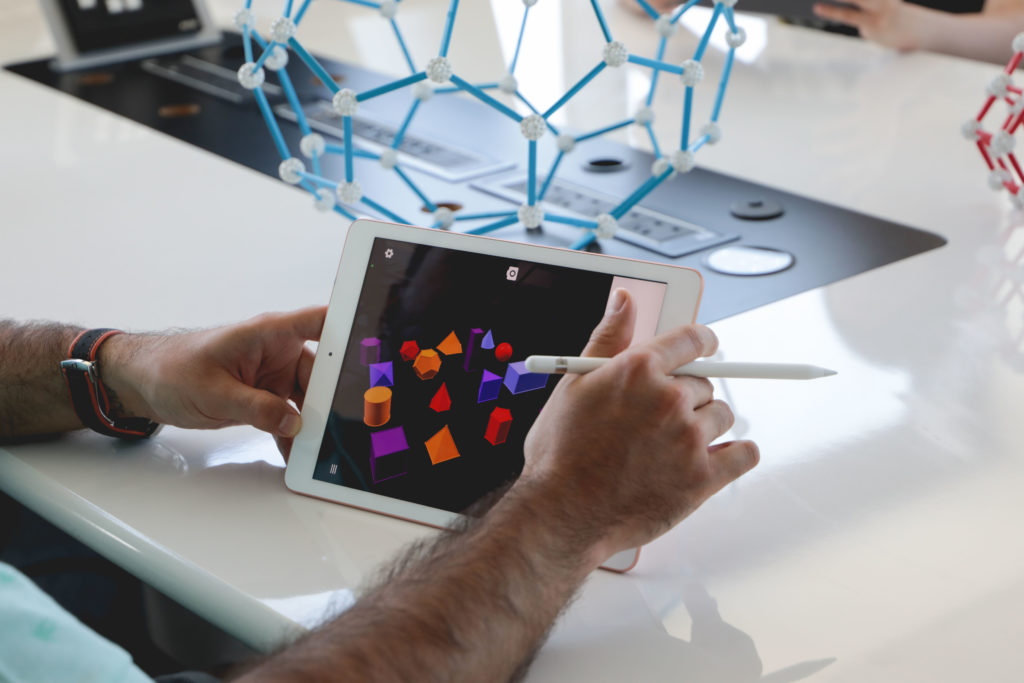Since 2018 we’ve been piloting the use of iPads to enhance our mathematics programmes. These devices are now at the centre of our teaching and student experience.
iPads for lecturers
iPads for lectures
We use iPads instead of whiteboards to deliver high-quality, interactive, technology enhanced lectures. These lectures are recorded so you can revisit the maths at a pace comfortable for you!
iPads for feedback
We use iPads to provide quick, useful feedback on your draft work and email queries. iPads give us the flexibility to explain maths in the clearest, most appropriate way.
iPads for students
From their first year our specialist maths students are loaned iPads for the duration of their studies. This has helped us build a connected community of students and lectures, transforming the way we learn maths together.
Conferences
We’ve shared our effective approach with iPads at national and international conferences:
AdvanceHE Curriculum Symposium 2021: Post-pandemic Curriculum
Title: Digital pedagogy in a world of digital poverty: the Middlesex iPad project.
Date: 8th June 2021
Presenters: Dr. Matthew Jones, Dr. Alison Megeney & Dr. Nick Sharples
Abstract:
Before the pandemic Middlesex University’s department of Design Engineering and Mathematics were trialling the use of iPads to present and record lectures, prepare videos and teaching materials, and provide feedback. This development of our digital pedagogy accelerated in March 2020 as staff rapidly changed delivery modes during lockdown.
In this presentation we will detail these novel pedagogic approaches, enabled by iPads, which we will retain as part of our post-pandemic curriculum:
iPads are used as the primary vehicle of student/staff interactions to achieve true blended learning: Students use their iPads to work on collaborative, persistent (on-demand) whiteboards before, during, and after scheduled lecture times.
We have developed collaborative “problem-solving spaces”: Students use their iPads to contribute at times convenient for them, working with their peers to build solutions to complex problems over an extended period, embedding dynamic peer interaction and review into the learning experience.
Courses are designed so that all work can be completed, and feedback given, using the provided iPads to ameliorate digital poverty and provide equality of access.Seamlessly integrating rich multimedia content and handwriting over prepared slides on iPads distinguishes commentary from theoretical content with every pen-stroke, syllable, and critical conversation recorded for future study.
Session recording:
AdvanceHE Student Engagement Conference 2021: Leading Student Engagement in Times of Crisis and Transformation
Title: Collaboration and co-creation at a distance: using technology to enhance student engagement online
Date: 26th May 2021
Presenters: Dr. Matthew Jones, Dr. Alison Megeney & Dr. Nick Sharples
Abstract:
At Middlesex University we introduced Miro as part of our pandemic teaching provision after trialling many virtual whiteboards; it is now an integrated part of our learning and teaching strategy. We will discuss digital innovations in engagement including whiteboard apps and polling software for gamification of learning, and a wide variety of other online tools. These technologies when utilised and integrated appropriately are powerful tools for student engagement.
Over a number of years the mathematics team at Middlesex University have developed expertise in the use of technology in both the face-to-face setting and online. Students are given loan iPads and Apple Pencils to use during their studies on the programme. Having begun making the move to a more digitally inclusive teaching, learning and assessment strategy in 2017-2018, the team moved swiftly and confidently to online teaching when the first CoVid-lockdown occurred. Although our prior experience prepared us to teach online the reality of ensuring student engagement remained high quickly became an issue. Novelty gave way to the reality of digital poverty and the consequences of lockdown on lecturing staff and students’ mental health. Our focus had to move beyond the initial lecture/tutorial model of teaching to include high-quality learning experiences that gave students the opportunity to collaborate with peers and act as co-creators in sessions.
Our aim in this workshop is to explore the potential of using technology to enable students to co-create learning and teaching. We will share our experiences, both positive and negative, of using them live in class and on-demand and share staff and student evaluations of their use. We will introduce and discuss some of the ways we have used technology to build constructive learning sessions, and the innovations that we will take forward into the future of teaching when we return to campus.
Session recording:
Teaching And Learning Mathematics Online (TALMO) Workshop: Student Engagement and Interaction
Title: Video recording lectures: blending the quarantini
Date: 3rd September 2020
Presenters: Dr. Matthew Jones & Dr. Nick Sharples
Abstract:
The Middlesex Maths team have been using iPads to record hundreds of hours of lectures (live, on campus) since October 2018. When our campus closed due to Covid this infrastructure and experience meant we could swiftly adapt to on-line learning, ensuring our students didn’t miss a single lecture and were taught in a familiar way. In this presentation Matthew Jones and Nick Sharples will share their experiences with lecturing maths at levels 4-7 through iPads, the extra challenges of delivering live lectures remotely, and how these challenges have informed their plans of a blended learning approach starting in October. We cover:
How to survive the video-editing workload
How to breach the digital-divide
How to encourage remote engagement.
URL: http://talmo.uk/daysei.html#sharples
Session recording:

